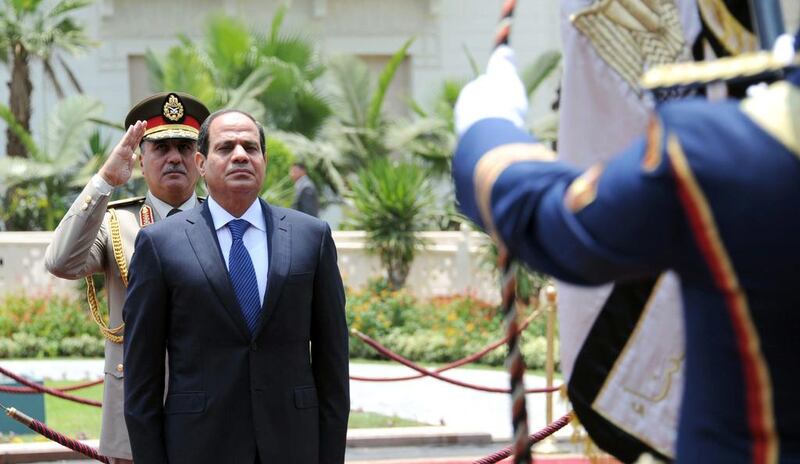CAIRO // The surprise move by Egypt’s newly elected president to slash much of the state subsidies on fuel and other energy products has shown the courage of the soldier-turned-politician in tackling head on one of his country’s most intractable problems.
Over the decades, Abdel Fattah El Sisi’s predecessors have either done nothing about subsidies eating up large chunks of the national budget or had to back down in the face of a popular backlash when they have tried to do so.
But more than a week after fuel prices rose by up to 80 per cent, the much-feared backlash over Mr El Sisi’s announcement has not yet materialised. There has been no street protests, no violence and no massive strikes. That does not mean that there was no discontent and grumbling, but none at a level that disrupted life or tempted the government to reconsider.
Initially, the rise in fuel prices created a mixture of confusion and shock among motorists. For no obvious reason, there were long lines outside petrol stations. There were also heated arguments between drivers of communal taxis and passengers over fares.
The government has repeatedly warned against attempts to take advantage of the price hikes and ended up arresting dozens of taxi drivers for their refusal to stick to the new fares that took into account the fuel price hikes.
Several political parties have also voiced their opposition to the increases. Last week, the liberal El Dustor party said the economic decisions were unfavourable to the poor and hastily passed. “It would have been more useful to look for ways to push economic activities, encourage investment, and adopt real austerity measures in terms of government spending,” the party said in a statement.
The reduction of fuel subsidies, which cost Egypt’s treasury about 143 billion Egyptian pounds (Dh73.44 bn) a year, has freed more than 50bn Egyptian pounds for spending on education, health and raising pensions, said Prime Minister Ibrahim Mahlab.
It came soon after a hike in electricity prices and was followed by steep rises in the price of cigarettes and alcoholic drinks. Mr El Sisi defended the move as a “bitter pill” to revive the country’s ailing economy and said he had put the interests of the nation ahead of whatever popularity he may lose by hiking fuel prices.
“Was there another choice? By God, no. Could we have delayed it? It was already years late,” Mr El Sisi said in a televised address last week. Common wisdom, explained the president, would have dictated that he holds off on such a decision to safeguard his popularity.
“But I have God first, and then all of you Egyptians,” he said.
Mr El Sisi had forewarned Egyptians before being elected that everyone will have to make sacrifices for the country so that it could stand on its feet again after three years of bloody turmoil. Moreover he had repeatedly hinted that subsidies must go or be vastly rationalised if the economy was to be healthy and that Egyptians must band together in the face of the economic crisis.
Egypt, he often said, cannot forever be dependent on handouts, either from the West or its generous friends in the Arabian Gulf region.
But a price hike is a price hike and the increase in fuel costs Mr El Sisi decreed led to a knock-on effect of price rises from taxi fares to vegetables and fruits and even school fees. It also comes at a time when most Egyptians are already suffering under the weight of a deepening economic crisis, with high unemployment and slumping tourism hitting millions of families. Disruptions of basic services like water and electricity are adding to the suffering during an exceptionally hot summer with temperatures over 40°C baking the nation.
“To be completely honest, we have been hard done by,” said taxi driver Mohammed Khalaf. “Passengers are screaming and every day there is an inspection by the police of our documents. I go home and there is no water and no electricity,” he said.
Araby Mahmoud, a farmer and father of five from the southern Assiut province, said the rise in fuel prices added to his troubles.
“I thought El Sisi was on the side of farmers, especially someone like me who has no income but what he gets from the land.
“I am like any other farmer, I have to repay loans I took from the bank and send my kids to university. The owners of machines that pump water to my land have raised their fee from 50 to 70 pounds for each acre. I don’t know what I will do.”
Mr El Sisi, elected in May and sworn in last month, has sought to cushion the effect of the fuel price hike, introducing a minimum wage for public sector workers, raising pensions and making more foodstuffs available in state-run outlets selling at discounted prices.
He has also moved to enforce a maximum wage for government and state-owned bank employees as part of his efforts to introduce a semblance of social justice.
Making good on his pledge that the military will always be on the people’s side, he ordered the deployment of army buses in cities for the public to use in a bid to force taxi drivers to respect the state-imposed fares or risk losing business.
foreign.desk@thenational.ae





